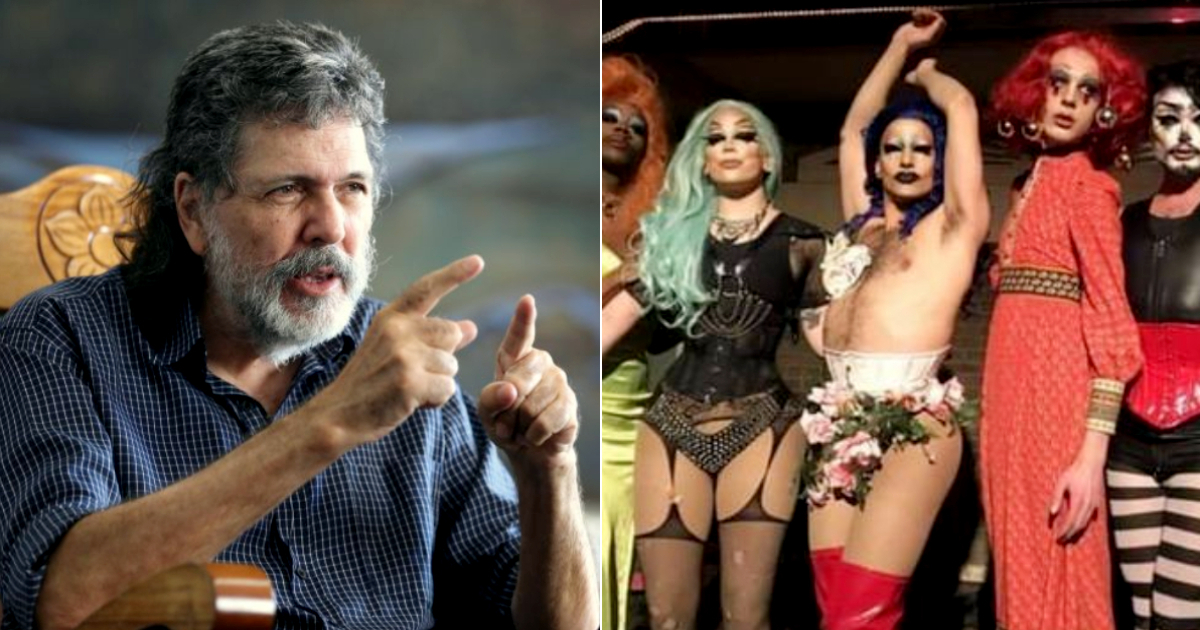Amid the controversy sparked on social media by a homophobic and transphobic tweet from former Cuban Minister of Culture, Abel Prieto Jiménez, he acknowledged the error of his message but maintained a tone of disdain towards the demands of the LGTBIQ+ movement.
The current president of Casa de las Américas and a notable enforcer of the Ministry of Culture (MINCULT) published a message on his social media in which he claimed that “the system promotes a false diversity to hide the authentic one,” accompanying his words with an image of members of the trans community contrasted with another image of indigenous people.
Despite deleting the post from his account on the social network X, Prieto Jiménez failed to grasp the offensive nature of his words, which were not well-received by activists and individuals close to the LGBTIQ+ community. Screenshots of his post were shared across other social media platforms.
In response to the uproar caused by his discriminatory message, the official intellectual published another message admitting the inappropriateness of his words. However, his apology remained equally insensitive towards the demands of the LGTBIQ+ community.
“I posted an image on social media that I associated with the confrontation between the fads and superficial stereotypes imposed by the capitalist market and the threats faced by the authentic cultures of the South. It was a mistake because it hurt the sensitivity of some friends and fueled the hatred of our eternal enemies,” the regime official muttered.
Despite acknowledging that it “was a mistake,” the former advisor to Fidel and Raul Castro persisted in equating the equality demands of the LGTBIQ+ collective with “fads and superficial stereotypes imposed by the capitalist market,” in contrast to “the threats faced today by the authentic cultures of the South.”
“Those who see racism, xenophobia, misogyny, machismo, sexism, homophobia, and transphobia as the most ferocious evidence of this cultural colonization against which we must tirelessly fight are correct. ‘Your fight is my fight,’” concluded the president of Casa de las Américas, inadvertently admitting his uncritical reproduction of patterns originating from the very “cultural colonization” he was attempting to denounce.
The official’s “apologies” were also mocked and criticized by social media users.
“I don’t know what’s worse, the original post (deleted because, as usual, they only realize these atrocities if there’s a reaction, never on their own), or the explanation that followed, where he talks about sexual identities as a fad and takes the opportunity to harp on about the enemy,” remarked academic Hilda Landrove on her social media.
The former president of the Union of Writers and Artists of Cuba (UNEAC) has a history of blunders on social media. In late July 2021, days after the historic protests of July 11 in Cuba, Prieto Jiménez lashed out at singer Yotuel Romero, one of the authors and performers of the urban genre anthem Patria y Vida.
Accusing him of marching in Madrid “alongside former slave owners” for leading a massive demonstration of Cubans in the Spanish capital demanding freedom for their homeland, the president of Casa de las Américas received a strong response from the rapper.
“You need to see me as a black man once again and attribute any comment to me that brings me closer to slavery, to once again show the institutional racism that lives in you and in all those around you,” expressed the former member of Orishas.
In a powerful text published on his Instagram account, Yotuel reminded Prieto Jiménez that he had marched in Spain with another 10,000 Cubans who were calling for freedom. Finally, he accused Abel Prieto of exhibiting the institutional racism that persists among the leaders of the Cuban state apparatus.
“What did happen and continues to happen is that six black men named Alexander, Randy, Maykel Osorbo, Descemer Bueno, El Funky created a song that resonated with our people. However, you, as Minister of Culture, have done absolutely nothing of significance that the people can remember fondly. You will go down in history as an oppressor who never fought for the freedom of art,” he concluded.
Understanding Abel Prieto’s Controversial Statements
Here are some frequently asked questions and answers to provide further insight into the controversy surrounding Abel Prieto's statements and the ongoing issues within the LGTBIQ+ community in Cuba.
What was the content of Abel Prieto's controversial tweet?
Abel Prieto's tweet claimed that "the system promotes a false diversity to hide the authentic one," and was accompanied by an image comparing members of the trans community with indigenous people. This message was flagged as homophobic and transphobic.
How did the LGTBIQ+ community react to Prieto's statements?
Activists and individuals close to the LGTBIQ+ community criticized Prieto's statements for being offensive and insensitive. They took screenshots of his post and shared them across other social media platforms to highlight the issue.
What was Prieto's response to the backlash?
Prieto issued a follow-up message acknowledging that his original post was a mistake, but his apology was seen as equally insensitive. He maintained his stance that the demands of the LGTBIQ+ community were akin to superficial trends imposed by the capitalist market.
How did Yotuel Romero respond to Prieto's past criticisms?
Yotuel Romero strongly rebuked Prieto, accusing him of institutional racism and highlighting that the song "Patria y Vida," created by six black men, had a significant impact on the Cuban people, unlike Prieto's contributions as Minister of Culture.
